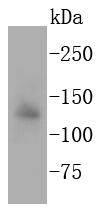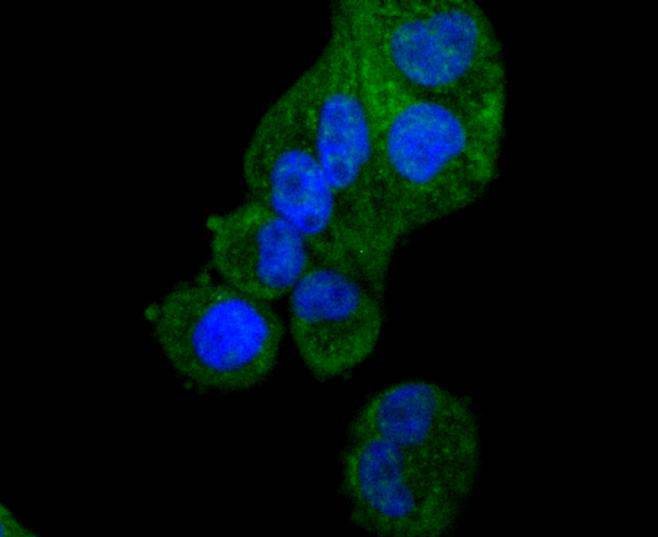Product Name :
Apaf-1 polyclonal antibody Background :
The mammalian homologs of the Ced-4 proteins, Apaf-1 (Ced-4), Nod1 (CARD4), and Nod2 contain a caspase recruitment domain (CARD) and a putative nucleotide binding domain, signified by a consensus Walker's A box (P-loop) and B box (Mg2+-binding site). Nod1 contains a putative regulatory domain and multiple leucine-rich repeats. Nod1 is a member of a growing family of intracellular proteins which share structural homology to the apoptosis regulator Apaf-1. Nod1 associates with the CARD-containing kinase RICK and activates NFkB. The self-association of Nod1 mediates proximity of RICK and the interaction of RICK with IKKg. In addition, Nod-1 binds to multiple caspases with long prodomains, but specifically activates caspase-9 and promotes caspase-9-induced apoptosis. Nod2 is composed of two N-terminal CARDs, a nucleotide-binding domain, and multiple C-terminal leucine-rich repeats. The expression of Nod2 is highly restricted to monocytes, and activates NFkB in response to bacterial lipopoly-saccharides. Product :
Rabbit IgG, 1mg/ml in PBS with 0.02% sodium azide, 50% glycerol, pH7.2 Storage&Stability :
Store at +4°C after thawing. Aliquot store at -20°C or -80°C. Avoid repeated freeze / thaw cycles. Specificity :
Apaf-1 polyclonal antibody detects endogenous levels of Apaf-1 protein. Immunogen :
recombinant protein Conjugate :
Unconjugated Modification :
Unmodification
Apaf-1 polyclonal antibody Background :
The mammalian homologs of the Ced-4 proteins, Apaf-1 (Ced-4), Nod1 (CARD4), and Nod2 contain a caspase recruitment domain (CARD) and a putative nucleotide binding domain, signified by a consensus Walker's A box (P-loop) and B box (Mg2+-binding site). Nod1 contains a putative regulatory domain and multiple leucine-rich repeats. Nod1 is a member of a growing family of intracellular proteins which share structural homology to the apoptosis regulator Apaf-1. Nod1 associates with the CARD-containing kinase RICK and activates NFkB. The self-association of Nod1 mediates proximity of RICK and the interaction of RICK with IKKg. In addition, Nod-1 binds to multiple caspases with long prodomains, but specifically activates caspase-9 and promotes caspase-9-induced apoptosis. Nod2 is composed of two N-terminal CARDs, a nucleotide-binding domain, and multiple C-terminal leucine-rich repeats. The expression of Nod2 is highly restricted to monocytes, and activates NFkB in response to bacterial lipopoly-saccharides. Product :
Rabbit IgG, 1mg/ml in PBS with 0.02% sodium azide, 50% glycerol, pH7.2 Storage&Stability :
Store at +4°C after thawing. Aliquot store at -20°C or -80°C. Avoid repeated freeze / thaw cycles. Specificity :
Apaf-1 polyclonal antibody detects endogenous levels of Apaf-1 protein. Immunogen :
recombinant protein Conjugate :
Unconjugated Modification :
Unmodification
-
 Western blot analysis of Apaf-1 on HUVEC cell lysates using anti-Apaf-1 antibody at 1/1,000 dilution.
Western blot analysis of Apaf-1 on HUVEC cell lysates using anti-Apaf-1 antibody at 1/1,000 dilution. -
 ICC staining Apaf-1 in Hela cells (green). The nuclear counter stain is DAPI (blue). Cells were fixed in paraformaldehyde, permeabilised with 0.25% Triton X100/PBS.
ICC staining Apaf-1 in Hela cells (green). The nuclear counter stain is DAPI (blue). Cells were fixed in paraformaldehyde, permeabilised with 0.25% Triton X100/PBS.
Bioworld Biotech only provide peptides for our antibodies and do not provide additional peptide customization services.
Price/Size :
USD 368/1mg/vial
Tips:
For phospho antibody, we provide phospho peptide(0.5mg) and non-phospho peptide(0.5mg).Describe :
Blocking peptides are peptides that bind specifically to the target antibody and block antibody binding. These peptide usually contains the epitope recognized by the antibody. Antibodies bound to the blocking peptide no longer bind to the epitope on the target protein. This mechanism is useful when non-specific binding is an issue, for example, in Western blotting (WB) and Immunohistochemistry (IHC). By comparing the staining from the blocked antibody versus the antibody alone, one can see which staining is specific; Specific binding will be absent from the western blot or IHC performed with the neutralized antibody.Formula:
Synthetic peptide was lyophilized with 100% acetonitrile and is supplied as a powder. Reconstitute with 0.1 ml DI water for a final concentration of 10 mg/ml.The purity is >90%,tested by HPLC and MS.
Storage:
The freeze-dried powder is more stable. For short time at 2-8°C. For long term storage store at -20°C.
Note :
This product is for research use only (RUO only). Not for use in diagnostic or therapeutic procedures.
 Apaf-1 polyclonal antibody
Apaf-1 polyclonal antibody  Datasheet
Datasheet COA
COA MSDS
MSDS SHIP
SHIP